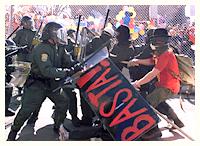
Image: AP/Wideworld
If anyone needed a reminder that violence and publicity for protest movement are directly related, the disruption of the Summit of the Americas in Quebec City last weekend provides a classic example of doing good while throwing hard objects at big sheets of glass.
Back in November 1999, the American left found itself involuntarily reinvigorated. Anti-free-trade protestors turned downtown Seattle into a riot zone during a meeting of the World Trade Organization. Traditional liberals deplored the images of trash cans crashing through plate-glass Starbucks windows, claiming that their peaceful, non-violent objections against transnational corporate hegemony had been subverted by a small band of anarchist goons.
But the rocks, tear gas and broken glass had their desired effect: They turned the WTO conference into mayhem. Delegates were trapped in their hotels. Meetings were cancelled. More importantly, for the first time since NAFTA went into effect in 1994, mainstream news reports began seriously questioning the benefits of free trade agreements. Corporate globalization, once taken for granted, was up for debate.
Five months later, in April 2000, traditional opposition groups — unions, environmental groups and leftist parties — converged on Washington DC to protest a meeting of the World Bank and International Monetary Fund, both linchpins of the trade globalization movement. D.C. police were determined to avoid a repeat of Seattle, and mainstream protesters squeamish about deviating from the Gandhi-King tradition of passive non-violence obliged them. Protesters were corralled in the streets where between 600 and 1,000 people — including members of the press — were shoved around and eventually arrested. Protest leaders even reportedly coordinated “peaceful arrests” in conjunction with police.
The D.C. protests proved both peaceful and useless. The IMF meetings went off without a hitch. Media analysts dwelled much more on the effectiveness of the cops’ riot-control tactics than they did on the exporting of high-wage jobs, or the working conditions in sweatshops and maquiladoras. There were more protests at the Democratic National Convention in Los Angeles. Violence was sparse; so was the television coverage.
There was some violence at the subsequent IMF/World Bank meeting in Prague, but Prague is in the Czech Republic, so Americans didn’t notice. Globalization fell off the political agenda for the remainder of the 2000 election year. Gore and Bush barely mentioned trade except to agree that it was a peachy thing, while the Green Party’s Ralph Nader — who made opposition to NAFTA and the WTO a centerpiece of his campaign — performed more poorly than expected.
Lefties just don’t seem to get this fundamental truth of politics: Not only has there never been a revolution without violence, but there’s never been meaningful social change without violence or at least the threat thereof. Mahatma Gandhi helped get the British out, but India remains as desperately poor and burdened by caste issues as ever. And the civil rights movement’s nonviolent marches took place against a backdrop of urban riots that helped force terrified white politicians to address racial discrimination.
Now we have the Quebec experience to reconfirm what students of history have understood all along. For two days, activists threw rocks and set fires while police used rubber bullets, water cannons, pepper spray and tear gas. Tens of thousands of people demonstrated peacefully while a far smaller group kicked ass. Guess which group garnered more attention for the anti-free-trade cause? “It was very successful for the movement,” noted retired sociologist Sel Burrows of Manitoba. “The wanton destruction was silly… but to bring attention to moderates, you have to have radicals.”
The struggle against free trade is far from over. But the Quebec protesters gave notice to leaders of other cities that they’ll pay a high cost for hosting such gatherings in the future. The anarchokids, with their willingness to break things, put this pressing issue back on the front burner where it belongs.












